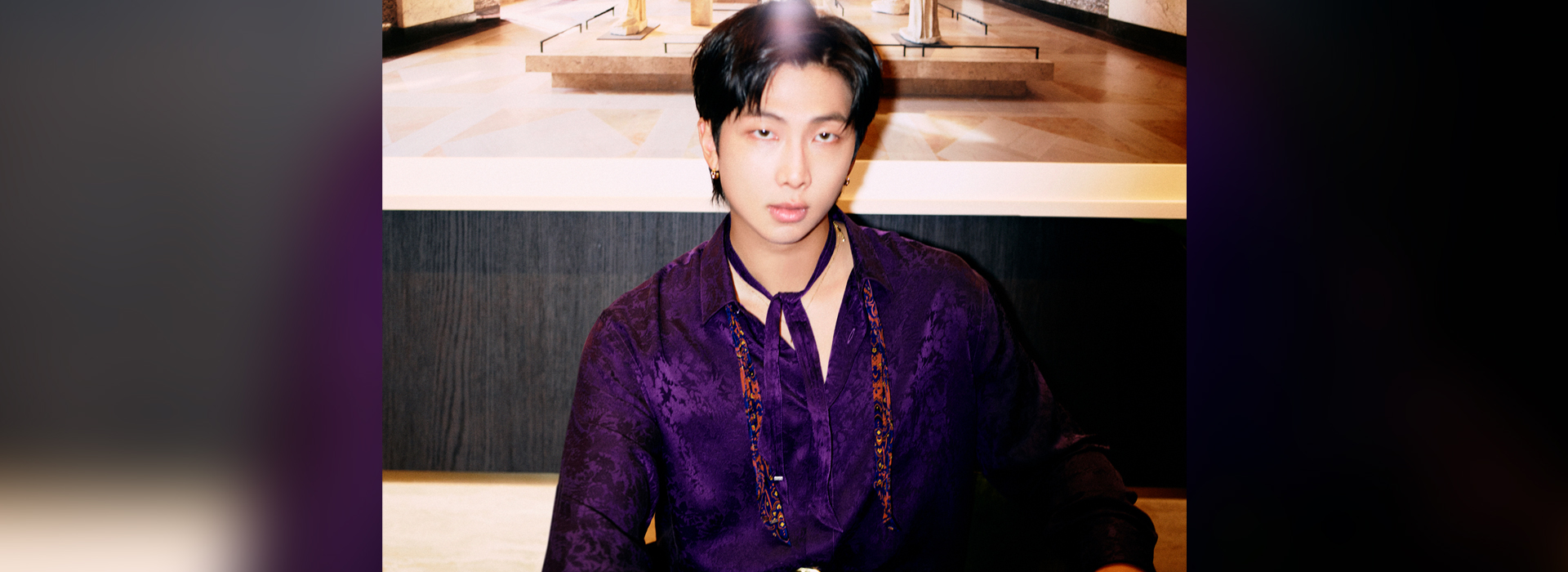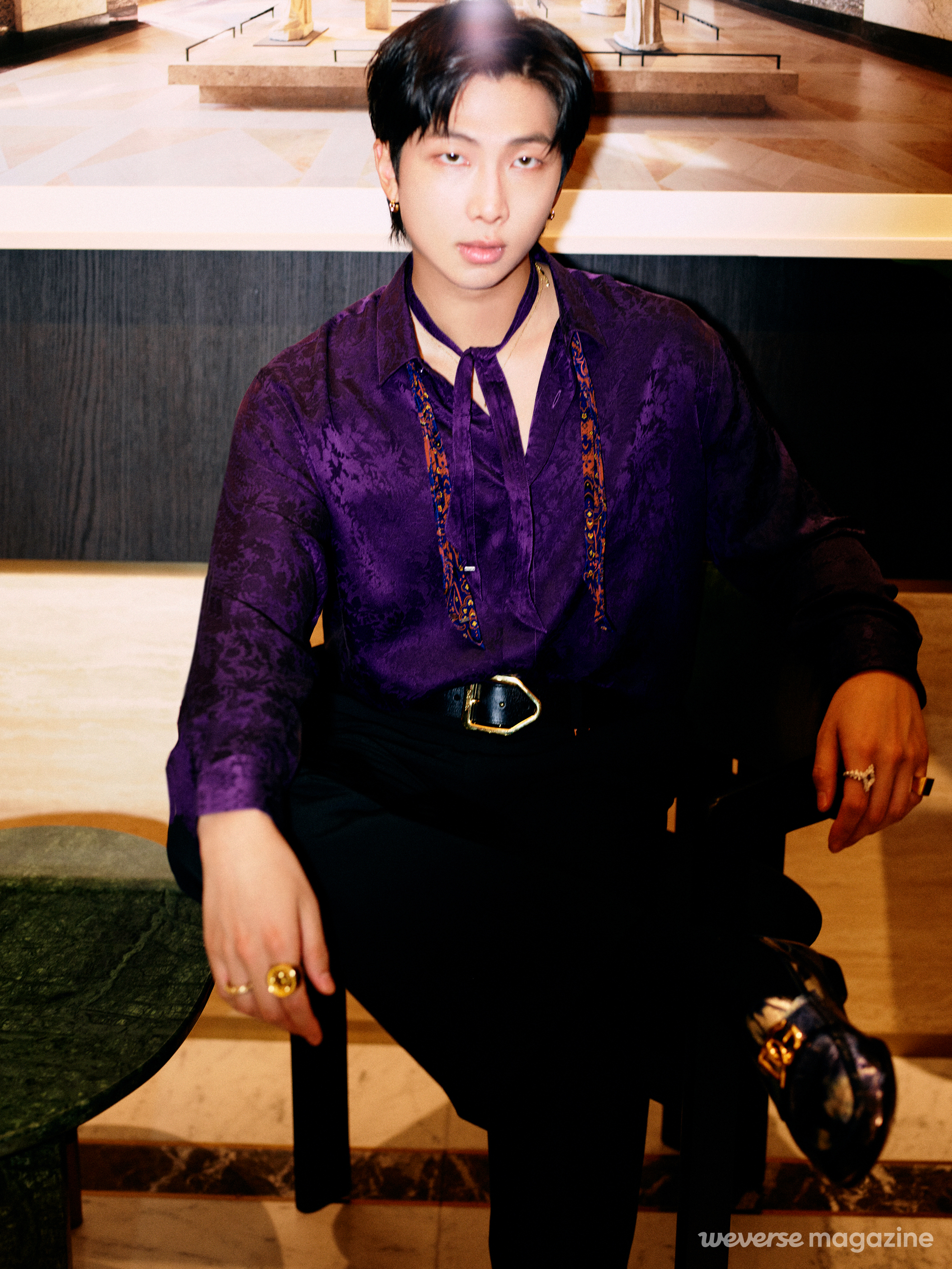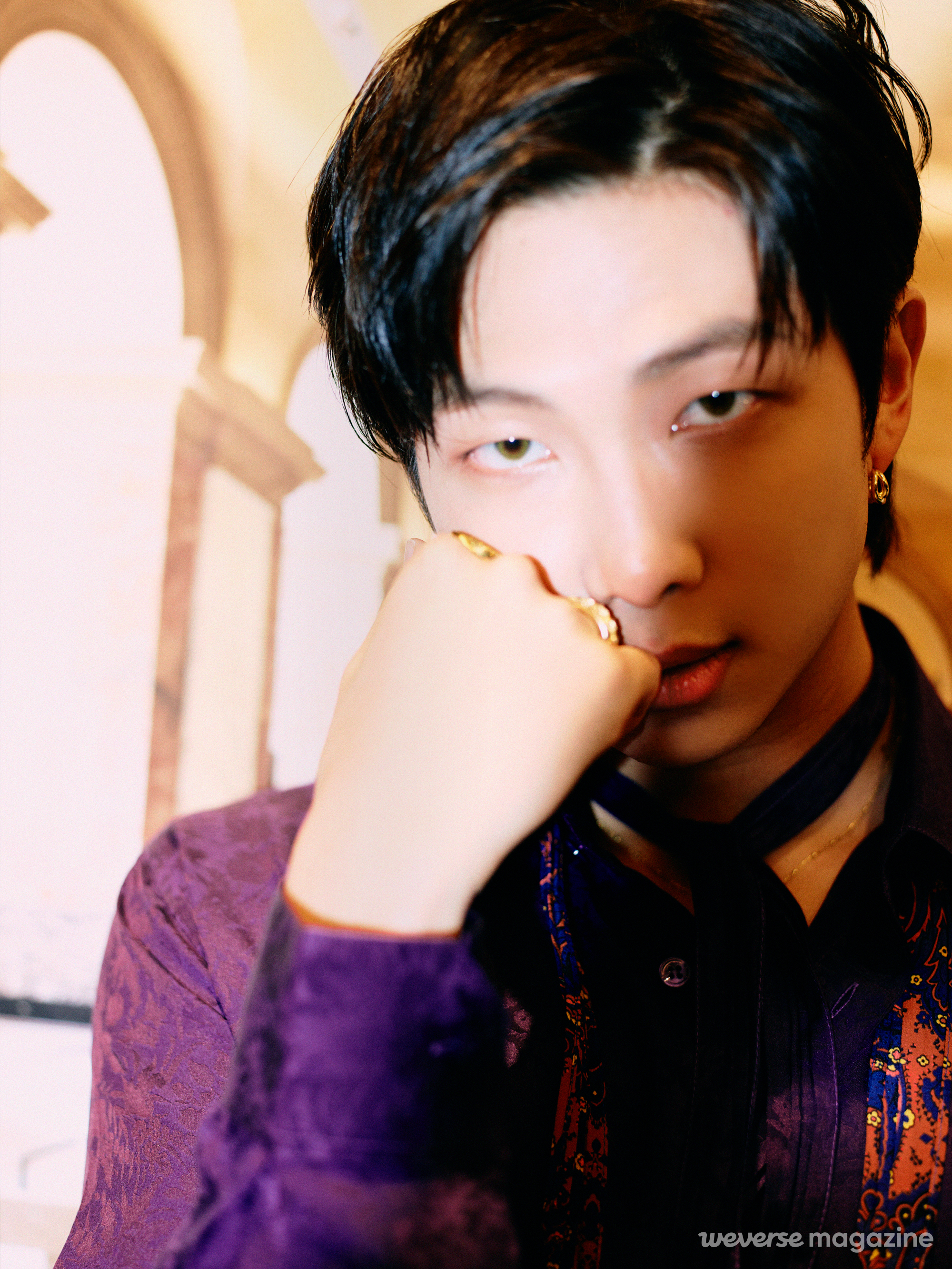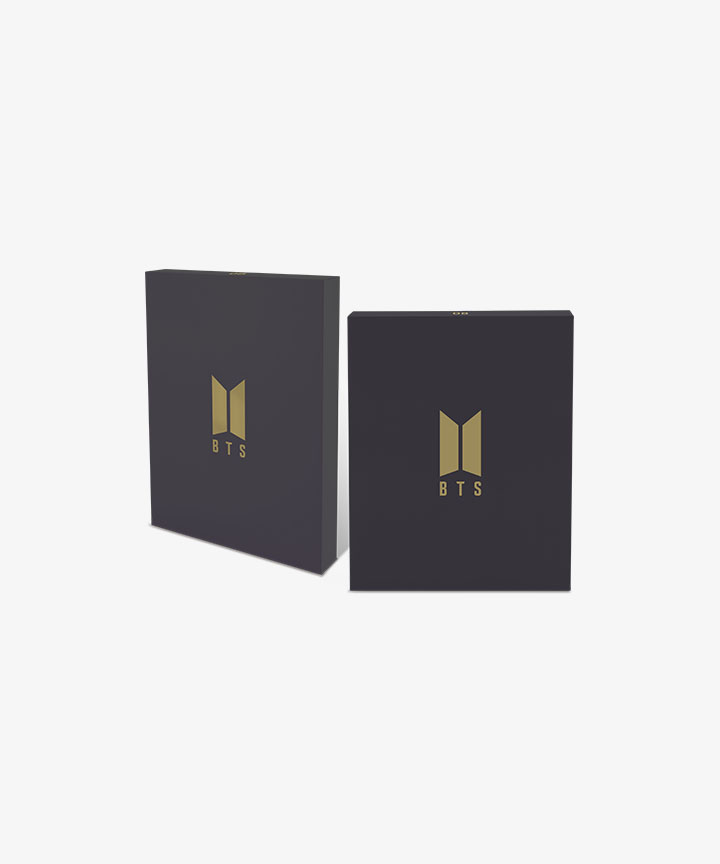
Both BTS and RM have proven themselves. And RM is dreaming of what comes next after Proof.
-
 Loafers by Dolce & Gabbana, earrings by S_S.IL.
Loafers by Dolce & Gabbana, earrings by S_S.IL.
The opening track on Proof is “Yet To Come.” What did you think it is exactly that’s yet to come?
RM: I had something like “High Hopes” in mind when I was first making “Yet To Come.” It’s like a kind of wish: Yeah, that’s right. Our glory days aren’t now—they’re still ahead of us. I started making it thinking it would be a universal thing for us to sing about it, but I’m not sure how it’ll be received once the album comes out. I hope it takes on an allure of its own as it floats around between people.
Do you have that kind of hope for yourself, too? Proof also includes the track “Intro: Persona,” which begins with the question, “Who am I?”
RM: I don’t know these days. I think I need to try taking a step away from myself for a minute. I think that way I’ll know what the work I’m doing right now means to me and what it is to me. So now I’m worried if I’m just doing the things I’m given and if I’m losing myself in a way.
What makes you think that?
RM: It was never my intention to live feeling this way, and I want to live an independent and active life, but now I’m starting to wonder if I’m living too passively because of the pandemic, and it’s unbearable. That includes how I felt at the Grammys, and I think I’ve hit a kind of wall.
What was it you felt at the Grammys?
RM: It’s something I felt when I looked at artists like Lady Gaga or H.E.R. who devote their entire lives to their music: We need a message so we can be sure and assert our own image, too. I think the performance of “Butter” we put on at the Grammy Awards astonished people. It was unique. I think it’s time for us to move beyond astonishing people and think again about what kind of messages we can send people now. I had time to think at the hotel while we had our concert in Las Vegas: what I should do, what I should say. So I think now I need to focus and take a look at the clues in my hands and find the solution in there.
In other words, it’s all “Yet To Come.” It means BTS has further to go.
RM: I don’t believe in maintaining the status quo. You don’t climb to the top and stay there by maintaining the status quo. I feel like I need to do something better but I haven’t been able to grasp what it is yet. I always thought we were the kind of group who always had a grasp of,I guess you could say,the tipping point in any situation we faced. And we always knew what we had to do every time, but now I feel like I’m not sure.
So the time has come to ask, “Who am I?” and, “What is BTS?”
RM: This is a very important issue to me right now. I definitely had a grasp of what this group is back in the day, but now it seems like I hit this phase where it’s impossible for me to know what the group is like or even who I am that clearly. So I think I need to find inspiration from people around the world. I have this urgent desire inside me to be inspired by all the inspiration and influence in the world. What should BTS be saying to the world from now on? What position should BTS be remembered for taking at this point? How are we going to function moving forward? I want to get inspiration about these things from others.
BTS’ fame spread even wider during the pandemic, after all. I could see from your US concerts that quite a few new people recently became ARMY.
RM: It hit me while we were performing that we crossed the threshold of a certain standard. You can feel the difference between when people know about you far and wide and feel ready to love you versus when they don’t. Maybe I could say there’s been more room for people to have access to BTS. I felt it in my bones. And I felt that a lot more people became familiar with us overseas thanks to “Dynamite” and “Butter,” too.
In the process of becoming more widely known, BTS worked with Chris Martin from Coldplay in Korea on “My Universe,” which was a big project, considering the stature of both groups. What was that experience like?
RM: I was surprised when he said he would come to Korea. He was also really genuine when we met him. Not only did he know all our names, he knew all about TOMORROW X TOGETHER and ENHYPEN, too. And not just in passing, either. Someone walked by while we were at the HYBE building and he said, “Isn’t that ENHYPEN?” I was like, Yo, how much did he study before he came here? (laughs) We also kept communicating while working on it and he was almost always the first one to send a text. I was seriously amazed.
Was it different working on a song where your whole group was featured on another artist’s song?
RM: It was important to decide the way we should arrange the Korean and English lyrics. We thought about splitting the first and second verses up between a Korean one and an English one. There were also talks of having Chris Martin try and sing part of the lyrics in Korean. But in the end we decided to juxtapose the Korean and English. So then it became important to find a good flow in the way the Korean and English lyrics were connected.
So BTS collaborated with Coldplay, that became a big hit across the global music industry and you even performed the song at the American Music Awards. How can you merge your own pursuits with the direction BTS is taking?
RM: I don’t think I’m going to change the whole style of the genre or anything, but I’m still eager to be the one and only. It’s a given when you’re an artist: You have to be the one and only. And I think I’m in a good position to become him. Because I’m a member of BTS. I guess I’m trying to find that unparalleled something while still doing what I like.
On Weverse, you wrote something like, “I can’t really watch the Harry Potter series or any Marvel stuff you recommend because I’m busy with other things.” And yet, you post pictures of different art exhibitions, including the Rothko Chapel, on your Instagram. I feel like the two are connected.
RM: I think the aesthetic I’m pursuing is ultimately reflected in my music. But I think the coolest thing of all is to make it look as natural as possible. These days you could call it a legit fit. (laughs) Things that are so natural, we can’t know for sure whether it’s all a setup or not, but either way, it never feels artificial. But K-pop is an industry, and it’s also very dynamic and a job that presents a fantasy. And so we have to present concepts to the fans sometimes. It’s become expected by fans who stan K-pop stars.
How do you feel about mixing those two things?
RM: So, I like things that are natural, but at the same time, I have my feet in an eye-catching, ever-changing, endlessly new and exhilarating industry, so I think about how to harmonize the two a lot. I think that paradox is one of my merits. For example, I’m still as drawn in by those strong concepts as ever, and I still listen to XXXTENTACION, too.
As one of your merits, how do you feel about being able to live both of those things at once? You’ve become widely popular during your time as a member of BTS, so you’ve seen a lot and learned a lot, too. But you’re young and you’re very interested in trends from around the world. It seems like you have achieved so much so early on in life.
RM: When I listen to songs that came out recently, I think they’re good and I’m impressed at how well-written they are, but I still think the emotional response that comes with experiencing older works is more intense. There’s something about them that touches your heart on a fundamental level. But as someone who’s working today—I mean, a newbie (laughs) trying to emulate that essence—if I were to claim to know everything there is to know about them, that would be an awful lie. I think that’s a key point when it comes to the things I’m concerned about. When I’m working with other artists and hear what they talk about, I realize that’s how people who dedicate themselves to their music live their lives, and I also get curious about other lifestyles or the kind of life I might have lived. Because people always think the grass is greener on the other side.
So you’re looking at other lifestyles from your position in the center of the global music industry.
RM: We’re working in the streaming era, and an era where songs are becoming progressively shorter. I’m quite sure the era is being influenced by the sentiments of the people living in it. So I’m considering whether we should also be focusing on the things that happen moment to moment and that instant sentiment it whips up. Put simply, that would mean we wouldn’t be able to look to the future. I’m considering whether that would be for the best and whether it’s a universal truth.
Unauthorized reproduction and distribution prohibited.


